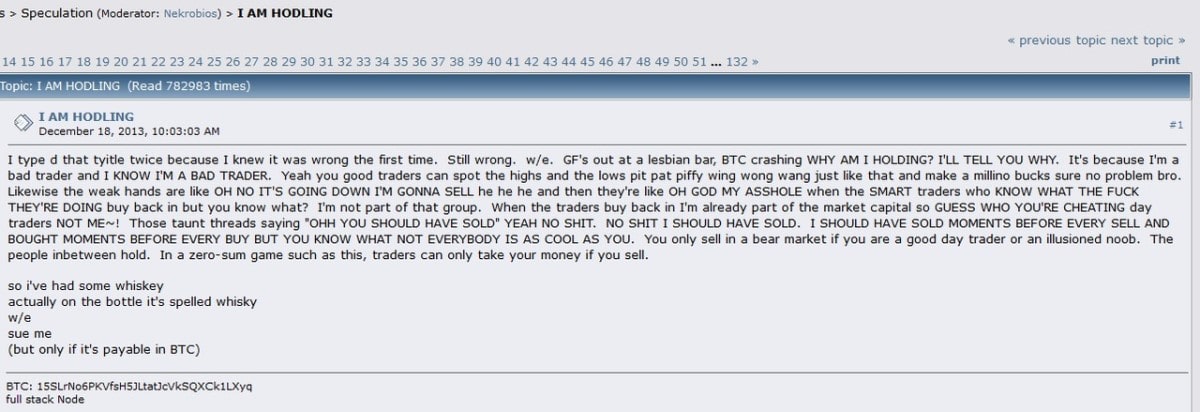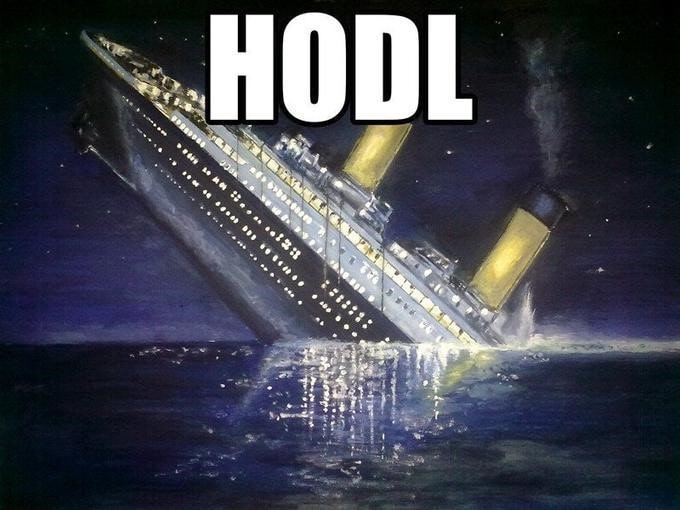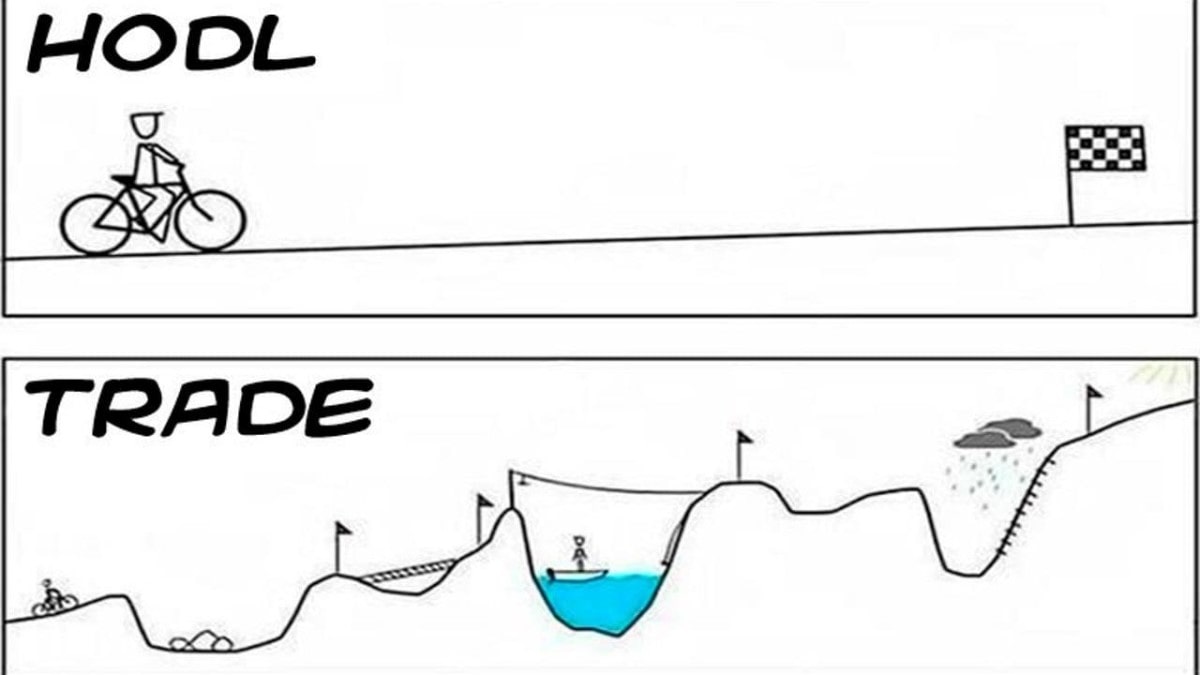HODL's meaning

Although the cryptocurrency community is relatively young, it has already managed to create its own culture, including specific terminology. For anyone interested in learning about cryptocurrency, understanding its unique terms is a must. Anyone who has taken even the slightest step into the crypto world most likely has heard the term "HODL". The term "HODL" in crypto was introduced back in 2013 and has since become one of the most commonly used acronyms of cryptocurrency investors and traders. So let's take a closer look at HODL's meaning.
What does HODL mean?
HODL means long-term cryptocurrency storage. Where did the term HODL come from? Initially, this term originated from the misspelling of the word "Hold", as holding is a strategy for buying and storing Bitcoin and other cryptocurrencies for an extended period (from several months to several years). To improve your trading skills, check out our complete Crypto Day Trading Guide in our blog.
Why HODL instead of hold? In 2013, a Bitcointalk forum user wrote a post entitled "I AM HODLING". In that post, the user said that, despite the recent fall in the price of Bitcoin, he wouldn't sell his BTC instead of continuing to hold it. He realised that since he wasn't a skilled enough trader and couldn't spot highs and lows, the best option for him would be simply not to sell and just hold Bitcoin. By the way, if you are considering buying Bitcoin, feel free to read about the easiest way to buy Bitcoin with a credit card.

The crypto community quickly became engaged with this post. People were particularly attracted by the new HODL acronym. There are a few reasons why the term became so popular.
First of all, it sounds funny. Besides that, many also saw that it somehow reflected the feeling of watching your cryptocurrency fall but continuing to hold. More specifically, the meaning of 'HODL Bitcoin' describes a trader's emotions. The feeling that a trader has when he gets confused and doesn't really know what's going on, so he decides to sit back and relax.

Since cryptocurrencies are a relatively new market, they attract a large number of newcomers. The mentality of an experienced trader is less prone to emotions and naturally different from that of a beginner. The ups and downs of the market always cause complex reactions from traders. These reactions trigger a wide range of fear, anxiety, excitement, confusion and, in this case, the strong desire to hold on tight. For one reason or another, it seemed the slang HODL meaning embodied all these thoughts in a single, misspelt word.
HODL Meaning for the Crypto Community
The term HODL in crypto has actually acquired a particular value in the community. Summing up on "Where did HODL come from?", HODL means that you keep your crypto no matter what because you're sure that you'll eventually cash in big when the value of your cryptocurrency skyrockets. That doesn't mean you just sit passively on your crypto, waiting for prices to rise. Instead, you HODL coin in the face of a massive and sudden drop in prices. You are resolved to survive the storm and plan to reap the benefits when it finally settles.

Other popular terms every cryptocurrency day trader must know
New terms are regularly added to the crypto community's slang. Below is a list of the most popular cryptocurrency terms:
- FOMO - Fear of missing out. A state of emotional or mental strain caused by an anxious feeling of missed profit.
- FUD - Fear, uncertainty and doubt. This is a misinformation strategy that affects perception by spreading negative, suspicious or false information and appeals to fear.
- BTFD - Buy the *ucking dip. The advice to other traders to pick up crypto that may have reached a low.
- Moon - The sharp rise in the price of a cryptocurrency "to the moon".
- ATH - All-time high. The highest price of a particular crypto coin ever achieved.
- Whale - Major traders and investors with massive amounts of cryptocurrencies who can influence their exchange rates.
- Fork - Splitting a cryptocurrency into two versions (in rare cases, more than two). The term comes from programming. A fork occurs when developers copy the source code of a program and start developing the copy in a different direction. Since every cryptocurrency is essentially a software program, the term "fork" is also applicable here. For example, Bitcoin has had several forks, the first of which was Litecoin, while other famous ones are Bitcoin Cash and Bitcoin Gold.
- REKT - This term refers to a trader or investor whose position has been liquidated by price movement contrary to its position, from the word "wrecked".
- Bull - This term was borrowed from the stock market. It refers to a trader or investor who believes that the price of a particular cryptocurrency will rise and wants to profit from that rise.
- Bear - The opposite of a bull, also from the stock market. It refers to a trader or investor who wants to profit from the price fall of a certain cryptocurrency.
- Bagholder - An investor or a trader who held his 'bag' of cryptocurrencies through big drops and didn't sell when he should have done.
- Pump - A verb. A sharp increase in the price of a cryptocurrency, usually artificial in nature.
- Dump - A verb. The opposite of 'pump'. A sharp decline in the price of crypto caused by a massive sell-off (offload by whales).
- Short - A verb. When the trader loans cryptocurrency from the exchange or broker and sells it at the current price. Then, he waits until the price drops and repurchases it at a lower price, returning it to the exchange and making a profit from that drop.
- Long - A verb. The opposite of short. The trader loans crypto from the exchange or a broker and buys it at the current price to sell at a higher price later. If the price moves in the opposite direction and the trade isn't protected with a stop-loss order, the trader might get REKT.
- Shitcoin - Low capitalisation cryptocurrencies that have no value that are created only to cut down money. Generally, the price of such coins is very low. However, being a 'shitcoin' does not always mean doom and gloom. Developers sometimes change course and turn their projects into something worthy.
- DYOR - "Do your own research". A warning that every bit of advice should be checked before making a decision.
- Exit Scam - This term traditionally refers to fraudulent projects designed only to earn money. It applies to dark web markets, ICOs, crypto projects and exchanges. There are many schemes — from complex ones when a project creates a good reputation, accumulates cryptocurrency and then disappears to rough scams when money disappears without any real work being done.
We hope you found this article informative and interesting and that it was able to tell you something about Bitcoin and cryptocurrency in general. Although cryptocurrency slang is continually evolving, these terms will give you a good sense of community vibes. So ignore the FUD. Always DYOR and HODL until the end!
Tags
Try our Bitcoin Cloud Miner and get additional crypto rewards based on your trading volume. It's immediately available upon registration.
Try our Bitcoin Cloud Miner and get additional crypto rewards based on your trading volume. It's immediately available upon registration.
FAQ
What is "HODL" in crypto?
"HODL" is a popular term that has been retrofitted as an acronym for "hold on for dear life" by crypto investors. It's encouraging others not to sell their investments when the prices fall. The HODL approach has benefited long-term investors in leading cryptocurrencies like Bitcoin and Ethereum (ETH). It has helped them to navigate the highly volatile crypto market.
Where did the term "HODL" come from?"
The term "HODL" originated from a spelling mistake. In 2013, a user with the username GameKyuubi posted on the BitcoinTalk forum. After drinks, they misspelt "I AM HOLDING" as "I AM HODLING." Other users found the mistake amusing and started using the term "hodlers" too. Even after almost a decade, the crypto meme is still popular and going strong.
Why HODL instead of hold?
The origin of HODL traces back to a misspelling of the word 'hold' induced by beverages. However, it has now taken on a deeper meaning in the HODL meaning slang.
HODL stands for 'Hold On (for) Dear Life', and it has become a term unique to the crypto community. HODL in crypto has proven to be a profitable strategy in the volatile market. By simply holding onto their coins, investors have seen the best returns of any asset class in the world, as shown in various Bitcoin success stories.
HODL in crypto has been 'hard forked to carry multiple meanings, but they all share the same ethos. Here are some of the definitions of HODL in crypto:
- HODL = HOLD
- Hold On (for) Dear Life
- Refusing to sell Bitcoin, Ethereum, Dogecoin or other cryptocurrencies.
- A rallying cry in the crypto community is to encourage people to continue holding their coins even during price drops or bear markets.
- Synonyms include diamond hands, long-term investment, time in the market beats, timing the market, going to the moon, and longing for the culture.
Is HODL coin a good investment?
Coin "HOLD" can be a safer option for investors as it reduces their exposure to short-term volatility and eliminates the risk of buying high and selling low. This phenomenon is common in the crypto market. True hodlers hold onto their coins or tokens even during market crashes and high volatility. Cryptocurrencies are highly volatile, providing great opportunities for traders to frequently establish long and short positions. However, hodling can offer more safety to investors as it shields them from short-term volatility and enables them to avoid the risk of buying high and selling low.



